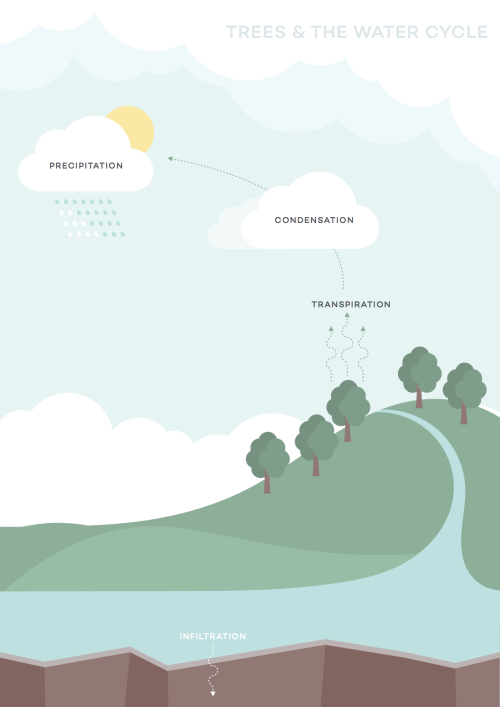Some of you have asked us ‘why don’t you help people in need instead of planting trees?’ Thankfully, that’s not a choice we ever had to make. While it might not seem immediately obvious, there are actually powerful links between reforestation and supporting people in need.
In fact, the World Bank estimates that forests contribute to the livelihoods of no less than 90% of the 1.2 billion people living in extreme poverty. Here are four ways how.
1. Agriculture
Reaching deep into the earth, tree roots draw up groundwater, purify it, and let it evaporate through their leaves. This moisture gathers into clouds before returning to Earth as rain. Without this primordial cycle there would be no agriculture at all.

Agriculture also depends on healthy soil, which trees protect from erosion. Trees regulate the temperature of the air and earth, and make moisture available to crops. They prevent soil salinization, shield crops from violent winds, and produce nutrients for all that grows around them. By providing a habitat for bees and other pollinating animals, they also contribute to crop fertilization.
Agroforestry plays an important role in all our planting programs. Before the implementation of our planting program in Burkina Faso, for instance, the local communities were suffering from the consequences of an increasingly arid soil. Hardly anything grew in it. But as soon as the local villagers started planting trees using the Vallerani technique, and surrounding the saplings with herbs, the soil started to soften. When we visited the project site last October, there was a further cause for celebration: it rained.
2. Forest Products
The forest provides an abundance of products to its human residents, ranging from nuts, berries, fruits, mushrooms, herbs and spices to biofuel, gums, oils, cork, peat and rubber. In Peru, where we support the Pur Projet reforestation programme, these forest products yield a higher net revenue per hectare than timber harvest would.
After these forest products are processed, their value multiplies. That is why we are currently supporting the Indonesian Gunung Saran Lester Foundation. Our shared aim is to build the zero-waste Tengkawang Nut Factory, which produces a sustainable alternative to palm oil. A second part of the project will focus on establishing the communitarian Village Hub, which produces valuable sugar syrup. Being able to put these products up for sale means that poor communities will no longer be forced to sell their land to palm oil multinationals.
3. Climate Change Adaptation
Climate change hits poor communities hardest, even though they least contribute to it. The unpredictable rain, the heatwaves and the cyclones that are the consequence of our warming planet devastate the crops and incomes of those who cannot afford any such thing to happen.
It is widely acknowledged that the planting of trees helps mitigate climate change. As they grow, trees remove carbon dioxide from the air and in turn release oxygen, the common currency of all life. But trees also help farmers adapt to climate change on a more local level. Surrounding a field with trees creates a microclimate that protects the crops against irregular rainfall and temperature extremes.
This tree superpower – creating a climatic buffer zone – has clearly manifested itself on our tree-planting site in the San Martin region, Peru, an area that was heavily deforested in the 80s. Before the trees were planted, the local cocoa harvest suffered from unpredictable weather and from a lack of shade. Today, the cocoa fields are increasingly surrounded by Pino Chuncho trees, Cedro Rosado trees, as well as many other shade-givers, and the cocoa yields — many farmers’ sole source of income — have started to improve.
4. Planting Project Salary
The reforestation projects we support also reduce poverty in a very direct way: by paying locals a fair wage for their tree-planting efforts, irrespective of their gender or social status. Actively involving local communities isn’t just essential to the ethical integrity of our projects, but also to their long-term success.
Our reforestation program led by Eden Projects in Madagascar, one of the world’s poorest countries, deliberately focuses on a region where stable jobs and reliable employers are scarce. The income local villagers receive for working on the project has helped them escape the vicious cycle of poverty by enabling them to buy land, improving their health, and helping them send their children to school.
Thus, by using Ecosia to finance the planting of trees, you don’t just help the environment. You also sow the seeds of a safer, healthier future for those who need it most.
